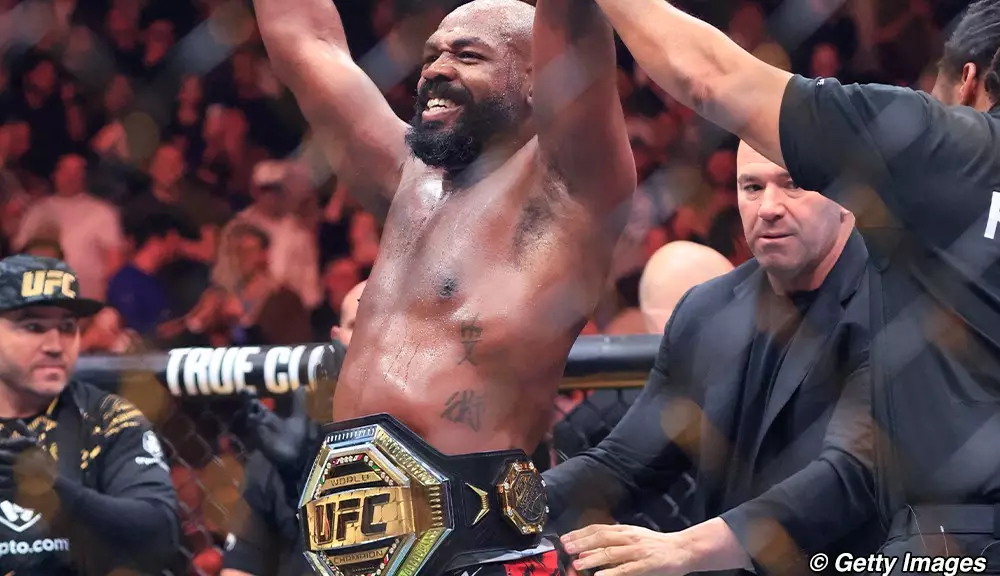In the high-octane world of mixed martial arts (MMA), where athletic prowess meets the brutal realities of competition, few stories have captivated fans as much as that of Jon Jones. Once embroiled in a fierce rivalry with fellow fighter Daniel Cormier, the narrative surrounding their relationship has evolved, making way for admiration and respect. Cormier, a two-division UFC champion himself, recently shared his thoughts on Jones’s remarkable ability to remain at the pinnacle of the sport for an extended period.
The landscape of MMA has often been characterized by rivalries that ignite fan interest and amplify the drama. The animosity between Jones and Cormier was palpable, encapsulating dramatic encounters that defined their careers. From UFC 182 to UFC 214, their confrontations were filled with tension, showcasing contrasting styles and personalities. However, as time passed and Cormier transitioned into retirement, their rivalry has matured into mutual respect. Cormier’s public acknowledgment of Jones’s accomplishments underlines a significant shift—one where personal grudges have given way to recognition of enduring excellence.
This evolution mirrors a broader pattern in sports where past rivals often find common ground through shared experiences and respect for each other’s achievements. In discussing Jones, Cormier remarked on the rarity of maintaining championship status over a lengthy period. By emphasizing this rarity, Cormier sheds light on the burdens that champions face, such as the relentless pressure to perform and the constant threat from emerging talents.
Daniel Cormier’s reflections during a recent episode of their podcast highlight an intriguing perspective: the generational shifts in the sport. He noted that as the UFC has transitioned from stars like Kamaru Usman and Alexander Volkanovski to a new breed of fighters, Jon Jones stands out as a constant figure. This not only illustrates Jones’s resilience but also showcases his adaptability in an ever-evolving fight landscape.
Cormier drew an apt analogy to the world of American football, likening Jones’s longevity to that of Tom Brady, who successfully competed across multiple eras. Both athletes defied traditional notions of ageing in their respective sports, rewriting what it means to achieve greatness over decades. Jones’s ability to compete and win showcases not only talent but also an extraordinary work ethic and mental fortitude, elements that are often overlooked in discussions about greatness.
Achieving longevity in a sport as unforgiving as MMA is no small feat. Cormier’s insights into the difficulties of maintaining championship status resonate deeply within the community of fighters and fans alike. The mental and physical toll of training, alongside the stress of combat, creates a formidable obstacle for any champion. Cormier noted that while champions like Usman and Volkanovski may appear unbeatable, they are continually under siege from younger, hungrier fighters looking to dethrone them.
Jones’s journey serves as a case study in the psychology of competition. As champions revel in their success, fresh talent is on the rise, prepared to challenge their reign. The awareness of this relentless pursuit adds an additional layer of pressure on champions, demanding an unyielding commitment to their craft. Cormier’s articulation of this dynamic encapsulates the essence of competition: an ongoing struggle to remain relevant amidst fierce competition.
As Jones continues to compete at the highest levels of the UFC, his legacy is being refined and redirected through each fight. His championship reigns are marred by controversies, yet undeniably, his skill set and accomplishments cannot be ignored. The respect shown by Cormier not only honors the fighter Jones has become but also serves as a reminder of the complexities of defining greatness in a sport filled with challenges.
Ultimately, the relationship between Jon Jones and Daniel Cormier reflects the duality of sport: rivalry and respect. As Cormier transitions into his role as a commentator and analyst, his journey alongside Jones can provide valuable insights into the nature of competition. Their narrative underscores an important lesson—the essence of sports lies not only in victories and championships but also in the respect earned through the shared struggle for greatness.

